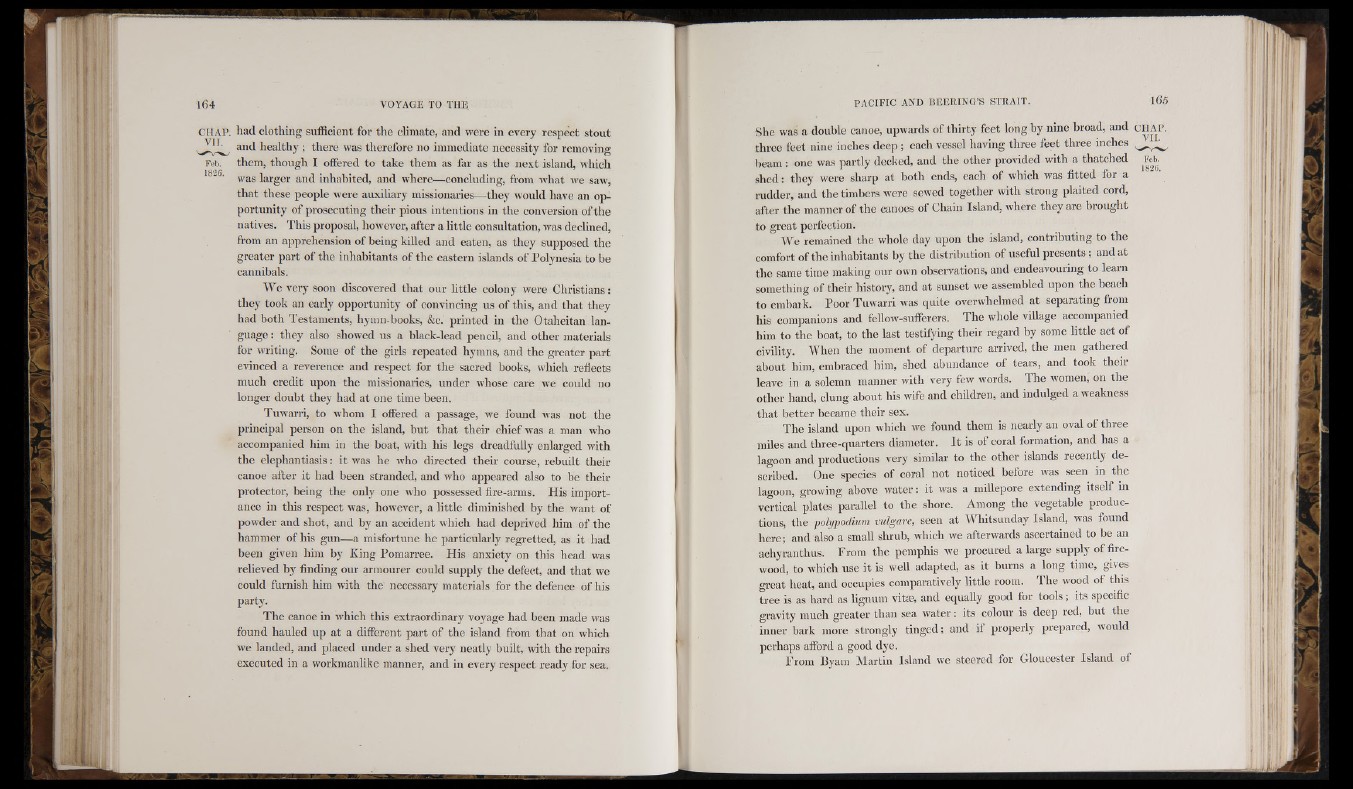
C H A P . had clothing sufficient for the climate, and w’ere in every respect stout
Feb.
1826,
and healthy ; there was therefore no immediate necessity for removing
them, though I offered to take them as far as the next island, which
was larger and inhabited, and where—concluding, from what w'e saw,
that these people were auxiliary missionaries—they would have an opportunity
of prosecuting their pious intentions in the conversion of the
natives. This proposal, however, after a little consultation, was declined,
from an apprehension of being killed and eaten, as they supposed the
greater part of the inhabitants of the eastern islands of Polynesia to be
cannibals.
We very soon discovered that our little colony were Christians;
they took an early opportunity of convincing us of this, and that they
had both Testaments, hymmbooks, &c. printed in the Otaheitan language
: they also showed us a black-lead pencil, and other materials
for writing. Some of the girls repeated hymns, and the greater part
evinced a reverence and respect for the sacred books, which reflects
much credit upon the missionaries, under whose care we could no
longer doubt they had at one time been.
Tuwarri, to whom I offered a passage, we found was not the
principal person on the island, but that their chief was a man who
accompanied him in the boat, with his legs dreadfully enlarged with
the elephantiasis; it was he who directed their course, rebuilt their
canoe after it had been stranded, and who appeared also to be their
protector, being the only one who possessed fire-arms. His importance
in this respect w’as, however, a little diminished by the want of
powder and shot, and by an accident which had deprived him of the
hammer of his gun—a misfortune he particularly regretted, as it had
been given him by King Pomarree. His anxiety on this head was
relieved by finding our armourer could supply the defect, and that we
could furnish him with the necessary materials for the defence of his
party.
The canoe in which this extraordinary voyage had been made was
found hauled up at a different part of the island from that on which
we landed, and placed under a shed very neatly built, with the repairs
executed in a workmanlike manner, and in every respect ready for sea.
She was a double canoe, upwards of thirty feet long by nine broad, and CHAP.
• ■ . 1 1 -.three feet nine inches deep; each vessel h1 avi1n g t1h ree feet three inch1eTsA ¿TfcC* Vl i .
beam : one was partly decked, and the other provided with a thatched
shed: they were sharp at both ends, each of which was fitted for a
rudder, and the timbers were sewed together with strong plaited cord,
after the manner of the canoes of Chain Island, where they are brought
to great perfection.
We remained the whole day upon the island, contributing to the
comfort of the inhabitants by the distribution of useful presents; and at
the same time making our own observations, and endeavouring to learn
something of their history, and at sunset we assembled upon the beach
to embark. Poor Tuwarri was quite overwhelmed at separating from
his companions and fellow-suIFerers. The whole village accompanied
him to the boat, to the last testifying their regard by some little act of
civility. When the moment of departure arrived, the men gathered
about him, embraced him, shed abundance of tears, and took their
leave in a solemn manner with very few words. The women, on the
other hand, clung about his wife and children, and indulged a weakness
that better became their sex.
The island upon which we found them is nearly an oval of three
miles and three-quarters diameter. It is of coral formation, and has a
lagoon and productions very similar to the other islands recently described.
One species of coral not noticed before was seen in the
lagoon, growing above water ; it was a millepore extending itself in
vertical plates parallel to the shore. Among the vegetable productions,
the polypodium vulgare, seen at YVhitsunday Island, was found
here; and also a small shrub, which we afterwards ascertained to be an
achyrantlius. From the pemphis we procured a large supply of firewood,
to which use it is well adapted, as it burns a long time, gives
great heat, and occupies comparatively little room. The wood of tins
tree is as hard as lignum vitm, and equally good for tools ; its specific
gravity much greater than sea water; its colour is deep red, but the
inner bark more strongly tinged; and if properly prepared, would
perhaps afford a good dye.
Erora Byam Martin Island we steered for Gloucester Island of
Feb.
1826.
ilL' ■
M: ! ,
M'
ji;; Iti:
i t